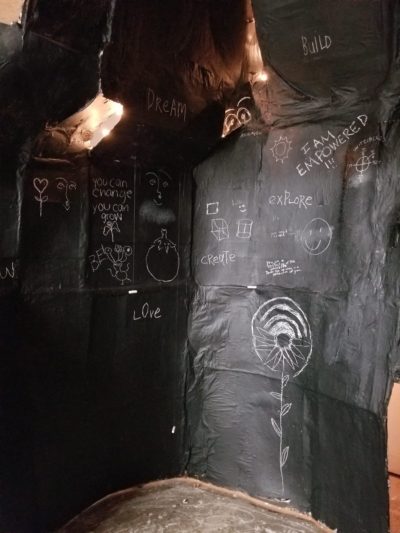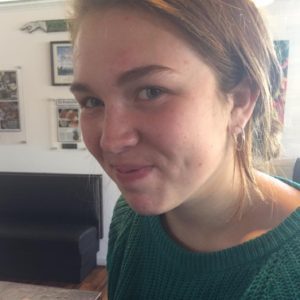My senior year of college at Clark University, I was working on an art installation. Being in my final year as a studio art major, I had access to my own studio. It was a big room in the basement of an academic building. It had a door, a small window, and bare walls. I had decided to explore concepts of play, anarchism, and imagination by building a “play cave.” The end product was as vague as my original ideas, but it led me through some profound explorations. I was halfway completed with this cave – I had painted the entire corner of my studio with black chalkboard paint, and built 4 walls out of cardboard, papier-mâché, and paint.
I had a call that day with a Jewish organizer looking to absorb me into his project. This was a familiar activity for me, having 1:1 phone calls with various lefty Jews, except this time I was also arms deep in papier-mâché as we talked on speaker phone. As this speaker-phone 1:1/papier-mâché project continued, I became increasingly aware of how creating and organizing in isolation was negatively impacting me. I was yearning to focus my art, Jewish practice, and organizing into one concentrated action.
Going into the New Voices fellowship, I was extremely excited and nervous. This was met with a wave of relief when I learned how sweet, magical, and deeply caring the other fellows were. I was met with a wave of excitement, joyous energy, and nerding out. Throughout the year of the fellowship, the support from other fellows and our editor, Daniel Holtzman, was my main source for building confidence and helped me grow my love and commitment to media as a tool for social change.
As a fellow my placement was with PROTOCOLS, an online cultural journal which focuses on politics and arts from the Jewish community. At the same time as joining the fellowship, I co-founded a Jewish collective that uses media and art to provide healing and “trouble-making.”
Working at PROTOCOLS helped me learn about how I could grow my own collective, and also about the importance of Jewish art and media in general. Everyone on the PROTOCOLS staff strongly believed that Jewish culture and arts were essential to making a change in our community. It inspired me to not only continue my work with my collective, but to strengthen the role that Judaism plays in my own artistic practice.
I really enjoyed my role in art curation for PROTOCOLS. It was fulfilling to do research on other Jewish artists’ practices and work and to see how they might fit into our vision for the issue. The New Voices fellowship grew my sense of self as a Jewish artist and organizer and helped me gain confidence that this is a possible path. Being a part of the fellowship cohort made me feel hopeful for the future, because I know that there are beautiful, passionate, and hardworking Jewish leaders who will continue to create powerful work.
רצון, ratzon, is a Hebrew word which means both the wish for something and the willingness to achieve it. As a young, Jewish artist I feel like I am in a constant state of dreaming. The concept of ratzon defies linear time; it situates us in our desire and dreams separate from what we think is logically possible. Ratzon gives us a temporary break from our reality in which we can focus our passion, desire, and skills to imagine the world we want to build.
I wish for a world in which ratzon is shared, in the broadest sense. Everyone should have access to space, or experience like the New Voices fellowship, in which they can find their own personal sense of ratzon, and sit between the two sides of what they want in the world and what it may take to actualize those dreams.


